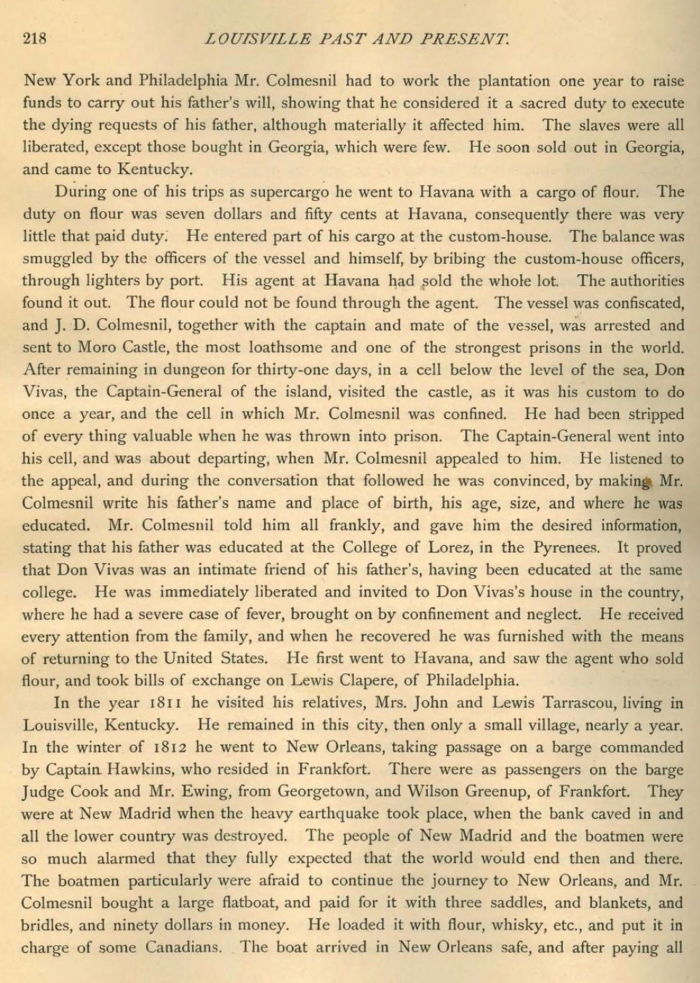
Louisville Past and Present: Its Industrial History
As exhibited in the Life-labors of its Leading Men.
by M. Joblin & Co., 1875, page 218

[previous page] ...New York and Philadelphia Mr. Colmesnil had to work the plantation one year to raise funds to carry out his father's will, showing that he considered it a sacred duty to execute the dying requests of his father, although materially it affected him. The slaves were all liberated, except those bought in Georgia, which were few. He soon sold out in Georgia, and came to Kentucky.
During one of his trips as supercargo he went to Havana with a cargo of flour. The duty on flour was seven dollars and fifty cents at Havana, consequently there was very little that paid duty. He entered part of his cargo at the custom-house. The balance was smuggled by the officers of the vessel and himself, by bribing the custom-house officers, through lighters by port. His agent at Havana had sold the whole lot. The authorities found it out. The flour could not be found through the agent. The vessel was confiscated, and J. D. Colmesnil, together with the captain and mate of the vessel, was arrested and sent to Moro Castle [a fortress guarding the entrance to Havana bay in Havana, Cuba], the most loathsome and one of the strongest prisons in the world.
After remaining in dungeon for thirty-one days, in a cell below the level of the sea, Don Vivas, the Captain-General of the island, visited the castle, as it was his custom to do once a year, and the cell in which Mr. Colmesnil was confined. He had been stripped of every thing valuable when he was thrown into prison. The Captain-General went into his cell, and was about departing, when Mr. Colmesnil appealed to him. He listened to the appeal, and during the conversation that followed he was convinced, by making Mr. Colmesnil write his father's name and place of birth, his age, size, and where he was educated. Mr. Colmesnil told him all frankly, and gave him the desired information, stating that his father was educated at the College of Lorez, in the Pyrenees. It proved that Don Vivas was an intimate friend of his father's, having been educated at the same college. He was immediately liberated and invited to Don Vivas's house in the country, where he had a severe case of fever, brought on by confinement and neglect. He received every attention from the family, and when he recovered he was furnished with the means of returning to the United States. He first went to Havana, and saw the agent who sold flour, and took bills of exchange on Lewis Clapere, of Philadelphia.
In the year 1811 he visited his relatives, Mrs. John and Lewis Tarrascou, living in Louisville, Kentucky. He remained in this city, then only a small village, nearly a year. In the winter of 1812 he went to New Orleans, taking passage on a barge commanded by Captain Hawkins, who resided in Frankfort. There were as passengers on the barge Judge Cook and Mr. Ewing, from Georgetown, and Wilson Greenup, of Frankfort. They were at New Madrid when the heavy earthquake took place, when the bank caved in and all the lower country was destroyed. The people of New Madrid and the boatmen were so much alarmed that they fully expected that the world would end then and there. The boatmen particularly were afraid to continue the journey to New Orleans, and Mr. Colmesnil bought a large flatboat, and paid for it with three saddles, and blankets, and bridles, and ninety dollars in money. He loaded it with flour, whisky, etc., and put it in charge of some Canadians. The boat arrived in New Orleans safe, and after paying all ... [next page]
If you, the reader, have an interest in any particular part of our county history, and wish to contribute to this effort, use the form on our Contact Us page to send us your comments about this, or any Bullitt County History page. We welcome your comments and suggestions. If you feel that we have misspoken at any point, please feel free to point this out to us.
The Bullitt County History Museum, a service of the Bullitt County Genealogical Society, is located in the county courthouse at 300 South Buckman Street (Highway 61) in Shepherdsville, Kentucky. The museum, along with its research room, is open 10 a.m. to 4 p.m. Monday through Friday. Saturday appointments are available by calling 502-921-0161 during our regular weekday hours. Admission is free. The museum, as part of the Bullitt County Genealogical Society, is a 501(c)3 tax exempt organization and is classified as a 509(a)2 public charity. Contributions and bequests are deductible under section 2055, 2106, or 2522 of the Internal Revenue Code. Page last modified: 12 Sep 2024 . Page URL: bullittcountyhistory.org/bchistory/colmesnil_lpp_3.html